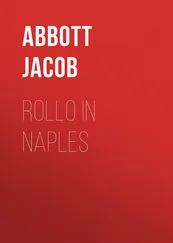Jacob Abbott - Rollo on the Atlantic
Здесь есть возможность читать онлайн «Jacob Abbott - Rollo on the Atlantic» — ознакомительный отрывок электронной книги совершенно бесплатно, а после прочтения отрывка купить полную версию. В некоторых случаях можно слушать аудио, скачать через торрент в формате fb2 и присутствует краткое содержание. Жанр: foreign_children, literature_19, foreign_antique, foreign_prose, на английском языке. Описание произведения, (предисловие) а так же отзывы посетителей доступны на портале библиотеки ЛибКат.
- Название:Rollo on the Atlantic
- Автор:
- Жанр:
- Год:неизвестен
- ISBN:нет данных
- Рейтинг книги:5 / 5. Голосов: 1
-
Избранное:Добавить в избранное
- Отзывы:
-
Ваша оценка:
- 100
- 1
- 2
- 3
- 4
- 5
Rollo on the Atlantic: краткое содержание, описание и аннотация
Предлагаем к чтению аннотацию, описание, краткое содержание или предисловие (зависит от того, что написал сам автор книги «Rollo on the Atlantic»). Если вы не нашли необходимую информацию о книге — напишите в комментариях, мы постараемся отыскать её.
Rollo on the Atlantic — читать онлайн ознакомительный отрывок
Ниже представлен текст книги, разбитый по страницам. Система сохранения места последней прочитанной страницы, позволяет с удобством читать онлайн бесплатно книгу «Rollo on the Atlantic», без необходимости каждый раз заново искать на чём Вы остановились. Поставьте закладку, и сможете в любой момент перейти на страницу, на которой закончили чтение.
Интервал:
Закладка:
Jacob Abbott
Rollo on the Atlantic
PREFACE
In the series of narratives to which this volume pertains, we offer to the readers of the Rollo Books a continuation of the history of our little hero, by giving them an account of the adventures which such a boy may be supposed to meet with in making a tour in Europe. The books are intended to be books of instruction rather than of mere amusement; and in perusing them, the reader may feel assured that all the information which they contain, not only in respect to the countries visited, and to the customs, usages, and modes of life that are described, but also in regard to the general character of the incidents and adventures that the young travellers meet with, is in most strict accordance with fact. The main design of the narratives is, thus, the communication of useful knowledge; and every thing which they contain, except what is strictly personal, in relation to the actors in the story, may be depended upon as exactly and scrupulously true.
New York, September , 1853.
PRINCIPAL PERSONS OF THE STORY
Rollo; twelve years of age.
Mr. and Mrs. Holiday; Rollo's father and mother, travelling in Europe.
Thanny; Rollo's younger brother.
Jane; Rollo's cousin, adopted by Mr. and Mrs. Holiday.
Mr. George; a young gentleman, Rollo's uncle.
Chapter I.
Taking Passage
When Rollo was about twelve years of age, he made a voyage to Europe under rather extraordinary circumstances. He went alone; that is to say, he had no one to take care of him. In fact, in addition to being obliged to take care of himself, he had also his little sister Jane to take care of; for she went with him. 1 1 It ought here to be stated, that Jane was not really Rollo's sister, though he always called her and considered her so. She was really his cousin. Her father and mother had both died when she was about six years old, and then Mr. and Mrs. Holiday had adopted her as their own child, so that ever since that time she had lived with Rollo and Nathan as their sister. She was very nearly of the same age with Nathan.
The way it happened that two such children were sent to sea on such a long voyage, without any one to have them in charge, was this.
Rollo's father and mother had gone to Europe to make a tour, a year before this time, and had taken Rollo's brother Nathan, or Thanny , as Rollo used most frequently to call him, with them. They had gone partly for pleasure, but more especially on account of Mr. Holiday's health, which was not good. It was thought that the voyage, and the recreation and pleasure of travelling in Europe, would be a benefit to him. In certain cases where a person's health is impaired, especially when one is slowly recovering from past sickness, nothing is found to have a more beneficial effect upon the patient than for him to go away somewhere and have a good time. It was determined to try the effect of this remedy upon Mr. Holiday, and so he went to Europe. Mrs. Holiday went with him. They took Thanny too, to be company for them on the way. Thanny was at this time about seven years old.
A child of that age, for a travelling companion, is sometimes a source of great pleasure, and sometimes, on the other hand, he is the means of great annoyance and vexation. This depends upon whether he is obedient, patient, quiet, and gentle in his manners and demeanor, or noisy, inconsiderate, wilful, and intractable. A great many children act in such a manner, whenever they take a journey or go out to ride with their parents, that their parents, in self-defence, are obliged to adopt the plan of almost always contriving to leave them behind.
It was not so, however, with Nathan. He was an excellent boy in travelling, and always made the ride or the journey more pleasant for those who took him with them. This was the reason why, when it was determined that Mr. and Mrs. Holiday should go to England, that Mrs. Holiday was very desirous that Nathan should go too. And so far as Nathan was concerned, the voyage and the tour proved to be all that Mr. and Mrs. Holiday expected or desired. In regard to other points, however, it was less successful. Mr. Holiday did not improve in health, and he did not have a good time. Mrs. Holiday was anxious about her husband's health, and she was uneasy too at being separated so long from her other two children,—Rollo and little Jane, especially little Jane,—whom she had learned to love as if she were really her daughter. So, before the year was ended, they both heartily wished themselves back in America again.
But now Mr. Holiday's health grew worse, and he seemed too ill to return. This was in the month of May. It was decided by the physician, that it would not be best for him to attempt to return until September, and perhaps not until the following spring. Mrs. Holiday was herself very much disappointed at this result. She, however, submitted to it very cheerfully. "I must be as good as Thanny," said she. "He submits patiently to his disappointments, and why should not I submit to mine. His are as great, I suppose, for him to bear as mine are for me."
When Mrs. Holiday found that she could not go to her children, she began to be very desirous that her children should come to her. She was at first almost afraid to propose such a thing to her husband, as she did not see how any possible plan could be formed for bringing Rollo and Jane across the wide and boisterous Atlantic alone. She, however, at length one day asked Mr. Holiday whether it would not be possible in some way to accomplish it.
Mr. Holiday seemed half surprised and half pleased when he heard this proposal. At first he did not appear to know exactly what to say, or even to think. He sat looking into the fire, which was blazing in the grate before him, lost apparently in a sort of pleasing abstraction. There was a faint smile upon his countenance, but he did not speak a word.
"That is an idea!" he said, at length, in a tone of satisfaction. "That is really an idea!"
Mrs. Holiday did not speak. She awaited in silence, and with no little anxiety, the result of her husband's meditations.
"That is really quite an idea!" he said at length. "Let us get Rollo and Jane here, and then we shall feel entirely easy, and can return to America whenever we get ready, be it sooner or later. We shall be at home at once where we are."
"I suppose it will cost something to have them come over," said Mrs. Holiday. She was not so anxious to have the children come as to desire that the question should be decided without having all the objections fully considered. Besides, she was afraid that if the question were to be decided hastily, without proper regard to the difficulties that were in the way, there would be danger that it would be reconsidered after more mature reflection, and the decision reversed. So she wished that every thing that could be brought against the project should be fully taken into the account at the outset.
"I suppose," said she, "that their expenses in coming out, and in returning, and in remaining here with us, in the interim, would amount to a considerable sum."
"Yes," said Mr. Holiday; "but that is of no consequence."
"I don't know what we should do about having them taken care of on the passage," added Mrs. Holiday.
"O, there would be no difficulty about that," said Mr. Holiday. "George could easily find some passenger coming out in the ship, who would look after them while at sea, I have no doubt. And if he should not find any one, it would be of no consequence. Rollo could take care of himself."
"And of Jane, too?" asked Mrs. Holiday.
"Yes," replied Mr. Holiday, "and of Jane, too; that is, with the help of the chambermaids. They have excellent chambermaids on board the Atlantic steamers."
Читать дальшеИнтервал:
Закладка:
Похожие книги на «Rollo on the Atlantic»
Представляем Вашему вниманию похожие книги на «Rollo on the Atlantic» списком для выбора. Мы отобрали схожую по названию и смыслу литературу в надежде предоставить читателям больше вариантов отыскать новые, интересные, ещё непрочитанные произведения.
Обсуждение, отзывы о книге «Rollo on the Atlantic» и просто собственные мнения читателей. Оставьте ваши комментарии, напишите, что Вы думаете о произведении, его смысле или главных героях. Укажите что конкретно понравилось, а что нет, и почему Вы так считаете.



![Jacob Abbott - Rollo's Philosophy. [Air]](/books/717773/jacob-abbott-rollo-s-philosophy-air-thumb.webp)








